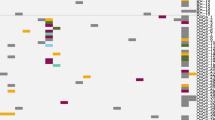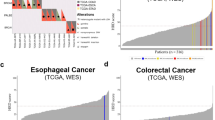Abstract
Next-generation sequencing (NGS)-based gene profiling can identify patients with pancreatic cancer with homologous recombinant repair gene pathogenic variants (HRRv). Several retrospective studies have reported a positive association between HRRv and the efficacy of platinum-based chemotherapy. However, this association remains to be validated in a prospective study. This multicenter, prospective, observational study included patients with histologically confirmed unresectable or recurrent pancreatic cancer who required systemic chemotherapy. Patients who were oxaliplatin-naïve patients were eligible. The HRRv status was measured using a College of American Pathologists-accredited NGS panel. One-year overall survival rate (1yr-OS%) was calculated after initiation of oxaliplatin-based chemotherapy and was set as the primary endpoint. Forty patients were enrolled between August 2018 and March 2020. The NGS success rate was 95% (38/40). HRRv was detected in 11 patients (27.5%). Oxaliplatin-based chemotherapy was administered to 9 of 11 patients with HRRv (81.8%) and 15 of 29 patients with non-HRRv (51.7%). The 1yr-OS% after initiation of oxaliplatin-based chemotherapy was 44.4% [95% confidence interval (CI) 13.7–71.9] and 57.1% (95% CI 28.4–78.0) in HRRv-positive and -negative cohorts, respectively. These data suggested that HRRv status alone could not be a potential predictive marker of oxaliplatin-based chemotherapy in patients with advanced pancreatic cancer. These results were in line with the results of a recent phase II study reporting the limited efficacy of poly(adenosine diphosphate–ribose) polymerase inhibitor in patients with pancreatic cancer who harbored HRRv other than BRCA. Future studies investigating patients with biallelic HRRv in the first-line setting are warranted.
Trial registration UMIN000033655.




Similar content being viewed by others
Data availability
Clinical data of patients in our study are not available for data sharing.
References
Mosele F, Remon J, Mateo J, et al. Recommendations for the use of next-generation sequencing (NGS) for patients with metastatic cancers: a report from the ESMO Precision Medicine Working Group. Ann Oncol. 2020;31:1491–505.
Casolino R, Paiella S, Azzolina D, et al. Homologous recombination deficiency in pancreatic cancer: a systematic review and prevalence meta-analysis. J Clin Oncol. 2021;39:2617–31.
Golan T, Hammel P, Reni M, et al. Maintenance olaparib for germline BRCA-mutated metastatic pancreatic cancer. N Engl J Med. 2019;381:317–27.
Reiss KA, Yu S, Judy R, et al. Retrospective survival analysis of patients with advanced pancreatic ductal adenocarcinoma and germline BRCA or PALB2 mutations. JCO PO. 2018. https://doi.org/10.1200/po.17.00152.1-9.
Wattenberg MM, Asch D, Yu S, et al. Platinum response characteristics of patients with pancreatic ductal adenocarcinoma and a germline BRCA1, BRCA2 or PALB2 mutation. Br J Cancer. 2020;122:333–9.
Golan T, Kanji ZS, Epelbaum R, et al. Overall survival and clinical characteristics of pancreatic cancer in BRCA mutation carriers. Br J Cancer. 2014;111:1132–8.
National Comprehensive Cancer Network. Pancreatic Adenocarcinoma (Version 2.2021) https://www.nccn.org/professionals/physician_gls/pdf/pancreatic.pdf. Accessed 12 Feb 2022
Lord CJ, Ashworth A. BRCAness revisited. Nat Rev Cancer. 2016;16:110–20.
Kondo T, Kanai M, Kou T, et al. Association between homologous recombination repair gene mutations and response to oxaliplatin in pancreatic cancer. Oncotarget. 2018;9:19817–25.
Park W, Chen J, Chou JF, et al. Genomic methods identify homologous recombination deficiency in pancreas adenocarcinoma and optimize treatment selection. Clin Cancer Res. 2020;26:3239–47.
Pishvaian MJ, Blais EM, Brody JR, et al. Overall survival in patients with pancreatic cancer receiving matched therapies following molecular profiling: a retrospective analysis of the Know Your Tumor registry trial. Lancet Oncol. 2020;21:508–18.
Sehdev A, Gbolahan O, Hancock BA, et al. Germline and somatic DNA damage repair gene mutations and overall survival in metastatic pancreatic adenocarcinoma patients treated with FOLFIRINOX. Clin Cancer Res. 2018;24:6204–11.
Boeva V, Popova T, Lienard M, et al. Multi-factor data normalization enables the detection of copy number aberrations in amplicon sequencing data. Bioinformatics. 2014;30:3443–50.
Conroy T, Desseigne F, Ychou M, et al. FOLFIRINOX versus gemcitabine for metastatic pancreatic cancer. N Engl J Med. 2011;364:1817–25.
Yoo C, Hwang JY, Kim JE, et al. A randomised phase II study of modified FOLFIRI.3 vs modified FOLFOX as second-line therapy in patients with gemcitabine-refractory advanced pancreatic cancer. Br J Cancer. 2009;101:1658–63.
Poplin E, Feng Y, Berlin J, et al. Phase III, randomized study of gemcitabine and oxaliplatin versus gemcitabine (fixed-dose rate infusion) compared with gemcitabine (30-minute infusion) in patients with pancreatic carcinoma E6201: a trial of the Eastern Cooperative Oncology Group. J Clin Oncol. 2009;27:3778–85.
Ohkawa S, Okusaka T, Isayama H, et al. Randomised phase II trial of S-1 plus oxaliplatin vs S-1 in patients with gemcitabine-refractory pancreatic cancer. Br J Cancer. 2015;112:1428–34.
Eisenhauer EA, Therasse P, Bogaerts J, et al. New response evaluation criteria in solid tumours: revised RECIST guideline (version 1.1). Eur J Cancer. 2009;45:228–47.
Momozawa Y, Sasai R, Usui Y, et al. Expansion of cancer risk profile for BRCA1 and BRCA2 pathogenic variants. JAMA Oncol. 2022;8:871–8.
Blair AB, Groot VP, Gemenetzis G, et al. BRCA1/BRCA2 germline mutation carriers and sporadic pancreatic ductal adenocarcinoma. J Am Coll Surg. 2018;226:630-637.e631.
Nakamura Y, Taniguchi H, Ikeda M, et al. Clinical utility of circulating tumor DNA sequencing in advanced gastrointestinal cancer: SCRUM-Japan GI-SCREEN and GOZILA studies. Nat Med. 2020;26:1859–64.
Momtaz P, O’Connor CA, Chou JF, et al. Pancreas cancer and BRCA: a critical subset of patients with improving therapeutic outcomes. Cancer. 2021;127:4393–402.
Javle M, Shacham-Shmueli E, Xiao L, et al. Olaparib monotherapy for previously treated pancreatic cancer with DNA damage repair genetic alterations other than germline BRCA variants: findings from 2 phase 2 nonrandomized clinical trials. JAMA Oncol. 2021;7:693–9.
Neesse A, Algül H, Tuveson DA, et al. Stromal biology and therapy in pancreatic cancer: a changing paradigm. Gut. 2015;64:1476–84.
Park JK, Lee JH, Noh DH, et al. Factors of endoscopic ultrasound-guided tissue acquisition for successful next-generation sequencing in pancreatic ductal adenocarcinoma. Gut Liver. 2020;14:387–94.
Kondo T, Matsubara J, Quy PN, et al. Comprehensive genomic profiling for patients with chemotherapy-naïve advanced cancer. Cancer Sci. 2021;112:296–304.
Takano S, Fukasawa M, Shindo H, et al. Clinical significance of genetic alterations in endoscopically obtained pancreatic cancer specimens. Cancer Med. 2021;10:1264–74.
Zill OA, Banks KC, Fairclough SR, et al. The landscape of actionable genomic alterations in cell-free circulating tumor DNA from 21,807 advanced cancer patients. Clin Cancer Res. 2018;24:3528–38.
Patel H, Okamura R, Fanta P, et al. Clinical correlates of blood-derived circulating tumor DNA in pancreatic cancer. J Hematol Oncol. 2019;12:130.
Singhi AD, George B, Greenbowe JR, et al. Real-time targeted genome profile analysis of pancreatic ductal adenocarcinomas identifies genetic alterations that might be targeted with existing drugs or used as biomarkers. Gastroenterology. 2019;156(2242–2253): e2244.
Hyman DM, Piha-Paul SA, Won H, et al. HER kinase inhibition in patients with HER2- and HER3-mutant cancers. Nature. 2018;554:189–94.
Johnson DB, Zhao F, Noel M, et al. Trametinib activity in patients with solid tumors and lymphomas harboring BRAF non-V600 mutations or fusions: results from NCI-MATCH (EAY131). Clin Cancer Res. 2020;26:1812–9.
Cleary JM, Wang V, Heist RS, et al. Differential outcomes in codon 12/13 and codon 61 NRAS-mutated cancers in the Phase II NCI-MATCH Trial of binimetinib in patients with NRAS-mutated tumors. Clin Cancer Res. 2021;27:2996–3004.
Hayashi H, Tanishima S, Fujii K, et al. Clinical impact of a cancer genomic profiling test using an in-house comprehensive targeted sequencing system. Cancer Sci. 2020;111:3926–37.
Acknowledgements
The authors would like to thank the patients for their kind cooperation and Junko Suga, Kanami Ashida, Kumi Mukai, Haruna Mori, and Yuki Furuya for their excellent technical assistance and secretarial help. We also would like to thank Yi-Hua Jan, PhD (ACTgenomics) for the support in writing the Methods section. We are also grateful to Asuka Mizushima and other staff of the data center (Medical Research Support).
Funding
This research was supported by a Grant-in-Aid for Scientific Research C (17K08413) from the Japan Society for the Promotion of Science and by the Japan Agency for Medical Research and Development, AMED, under Grant number 17kk0305006h0001.
Author information
Authors and Affiliations
Corresponding author
Ethics declarations
Conflict of interest
Masashi Kanai own stocks in Therabiopharma and received honoraria from Chugai Pharmaceutical Co., Ltd. Taro Funakoshi belongs to an endowed chair sponsored partly by Yakult Honsha Co., Ltd. and Chugai Pharmaceutical Co., Ltd. Manabu Muto received research funding and honoraria from Chugai Pharmaceutical Co., Ltd. All remaining authors have no conflict of interest to declare.
Additional information
Publisher's Note
Springer Nature remains neutral with regard to jurisdictional claims in published maps and institutional affiliations.
Supplementary Information
Below is the link to the electronic supplementary material.
Rights and permissions
Springer Nature or its licensor (e.g. a society or other partner) holds exclusive rights to this article under a publishing agreement with the author(s) or other rightsholder(s); author self-archiving of the accepted manuscript version of this article is solely governed by the terms of such publishing agreement and applicable law.
About this article
Cite this article
Kondo, T., Kanai, M., Matsubara, J. et al. Association between homologous recombination gene variants and efficacy of oxaliplatin-based chemotherapy in advanced pancreatic cancer: prospective multicenter observational study. Med Oncol 40, 144 (2023). https://doi.org/10.1007/s12032-023-02011-y
Received:
Accepted:
Published:
DOI: https://doi.org/10.1007/s12032-023-02011-y




